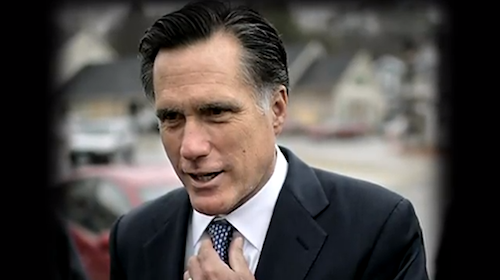Last month, Cory Booker saved his neighbor from a burning building. That’s called political capital, and it enables you to do stuff like, say, criticize an attack ad from a presidential campaign you support. Booker described the “Romney Economics” ad, which paints Bain Capital as a “job-killing economic vampire”—thank you, CBS—as “nauseating.” He was particularly bothered by what he perceived as an attack on private equity:
It’s nauseating to the American public. Enough is enough. Stop attacking private equity. Stop attacking Jeremiah Wright. This stuff has got to stop, because what it does is it undermines, to me, what this country should be focused on. It’s a distraction from the real issues.
Before you accuse Cory Booker of a false equivalence, you should see the ad, which really does portray Bain as a mad job destroyer leaving a trail of broken pension funds across the midwest. It’s also six minutes long and about a steel mill closure, so check to see if Bruce Springsteen is standing behind you before you watch it. You don’t want to wind him up.
httpv://www.youtube.com/watch?v=ZMndjLIQUFw
It’s difficult for me to decide how nauseating this video really is, since I already regard Bain as a cash-seeking missile whizzing around the economy to the sound of Romney’s forced chuckling. It certainly leaves some important questions unanswered—for example, how close to bankruptcy was this mid-nineties steel mill when Bain arrived? Over at the Wall Street Journal, Kimerbely Strassel makes a compelling argument that GST was in trouble before Bain bought it. She blames the mill’s failure on greedy, indolent unions, which reminds us that getting your fact checking about private equity from the Wall Street Journal is like reading about the NBA playoffs in a Ron Paul newsletter.*![]()
So what’s an American voter to do? The President’s campaign advertisement says that the millionaire financier running against him is evil, and the financial paper owned by the news network that hates the President says it’s a lie. This conundrum points out a little-discussed aspect of the oft-discussed problem that is negative campaigning: it forces us to treat all statements as probably false. In a positive campaign, where candidates focus on their own policy proposals, you can mostly assume that they are telling the truth. When a candidate says “I think we should implement a single-payer health insurance system,” he is probably not lying, because why would you make factually untrue statements about what you want to happen in the future? Barring a Dr. Doom scenario, where candidates say whatever to gain access to the water supply, it doesn’t make sense.
A negative campaign, on the other hand, continually offers opportunities to lie because it focuses on factual statements about the past. President Obama went to a church where the preacher said “cracker.” Mitt Romney made a million dollars by bankrupting a steel mill’s pension fund. Accusations like these make a presidential campaign more closely resemble a trial, where the object is not to convince the auditors that someone is great, but rather to establish what an ostensibly shitty person did. Such a procedure lends itself to deception, as the sterling reputation for honesty among lawyers suggests.
The 2012 general election is starting to look like a trial where either the defendant or the prosecutor is going to get the chair. The other guy becomes President. As much as that sounds like a rad way to run the criminal justice system, it is probably not good for American Democracy. If nothing else, we are going to spend the next six months with the background assumption that whatever these two candidates say is untrue. Then one of them will be our leader, and we will all try to believe him again.





There’s plenty of reason to think the positive things they say about themselves are lies, too. “I will close Guantanomo” comes to mind. Most campaign promises get broken.
I’m not aware that the Wall Street Journal hates the president. I don’t disbelieve it either. From where have you gotten the idea?
Read the WSJ editorial page for a week (or the right day), and you will get a pretty clear view of their perspective.
I was referring not so much to the WSJ specifically as to the network that owns it, News Corp. Between Fox News and the New York Post, I feel the charge of bias is legitimate.